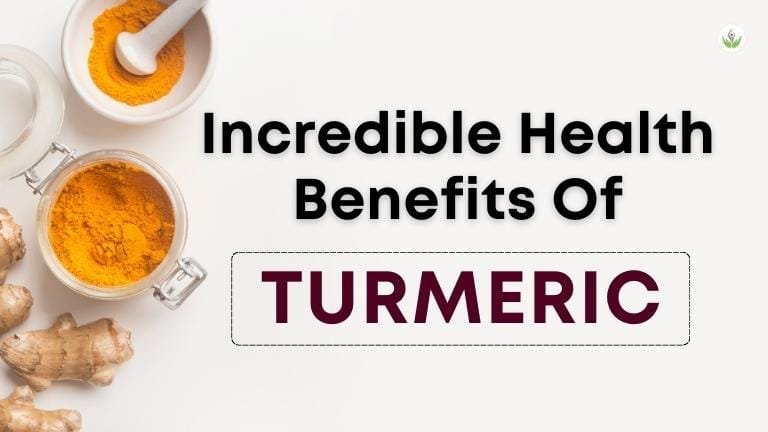Hi there, valued readers! Let’s go on a tasty adventure today as we learn about the incredible health benefits of turmeric and its highly sought-after ingredient, curcumin. When you think of the bright colors in a curry, turmeric is the star ingredient. Its bright yellow color and long history as a spice and medicine in India make it stand out. The incredible health benefits of turmeric make it a golden gem with numerous advantages for overall well-being.
Exploring the roots of this golden gem, we find that turmeric comes from the rhizome, or root, of an Asian plant that is related to ginger. Its warm, deep orange tones have been used in cooking for hundreds of years, giving it color, taste, and health benefits.
But what makes turmeric stand out are the chemicals called curcuminoids that are found in it. The most important of these is curcumin, which is the major active ingredient and is good for your health in many ways. By mixing old and new information, researchers have found that turmeric and curcumin may be good for your health.
Come with us as we look for the top 10 health benefits of turmeric and curcumin that have been proven to work. Mary-Eve Brown is a cancer clinical dietitian and nutritionist at Johns Hopkins Medicine. She will share her thoughts with us on the healthy parts of this golden beverage. Keep reading to get not only information but also useful tips on how to use turmeric in your cooking. Let the good things in gold shine in your life.
Unveiling the Potent Powers of Turmeric: A Golden Elixir for Well-Being
Turmeric is a natural wonder that stands out like a golden gem. Its magic comes from curcumin, a polyphenolic substance with the incredible health benefits of turmeric, including powerful anti-inflammatory and antioxidant properties. Mary-Eve Brown, a cancer clinical dietitian and nutritionist at Johns Hopkins Medicine, highlights that curcumin’s wide range of biological activities and turmeric’s high phytonutrient content make it highly effective at fighting free radicals and protecting cells from damage. People who consume plant-based foods, including turmeric with its incredible health benefits, may have a lower risk of cancer and heart disease.
Key Benefits of Turmeric:
- Anti-Inflammatory Marvel: Turmeric, with its active component curcumin, proves beneficial in managing inflammation associated with conditions like arthritis, joint disorders, colitis, allergies, and infections.
- Joint Pain Alleviation: Scientific studies suggest that individuals with osteoarthritis experience reduced joint pain when incorporating turmeric into their recipes.
- Mood and Cognitive Well-being: While ongoing research explores turmeric’s potential impact on mood disorders, depression, and dementia, early studies show promising signs, albeit requiring further investigation for conclusive benefits.
- Diverse Health Boost: Turmeric demonstrates potential benefits in addressing inflammation, degenerative eye conditions, metabolic syndrome, arthritis, hyperlipidemia (cholesterol), anxiety, muscle soreness post-exercise, and kidney health.
Unlocking the Potential:
Scientists have investigated turmeric to find out how it affects various aspects of health. Early study suggests that it may help with osteoarthritic joint pain as well as mood issues like depression and dementia. We will learn more about how turmeric helps our health in many ways as more research is done. Use the golden touch of turmeric and learn how it can help your health.
The Golden Benefits of Turmeric and Curcumin Simplified
Curcumin is the active ingredient in turmeric, and it has many health benefits that go beyond making foods look bright. To keep things simple, here are some of the great things it does:

- Medicinal Marvel: Turmeric contains bioactive compounds, mainly curcumin, a powerful anti-inflammatory and antioxidant, though in low amounts.
- Enhanced Absorption: Curcumin’s absorption gets a boost when paired with black pepper, thanks to piperine. This combo increases effectiveness, making supplements with both ingredients a smart choice.
- Anti-Inflammatory Champion: Curcumin combats inflammation, a major health factor, but requires high doses for medicinal effects, aiding overall well-being.
- Antioxidant Powerhouse: Curcumin neutralizes free radicals, countering oxidative damage implicated in aging and diseases. Clinical studies are underway to confirm its efficacy in humans.
- Brain Boost: Curcumin may increase brain-derived neurotrophic factor (BDNF), supporting brain health. Preliminary studies hint at benefits in memory, attention, and combating brain disorders.
- Heart Guardian: Research suggests curcumin aids in heart disease prevention by improving blood vessel function and reducing inflammation and oxidation.
- Cancer Defender: Curcumin shows promise in affecting cancer growth, reducing angiogenesis, and preventing metastasis. It may even help prevent certain cancers, particularly in the digestive system.
- Alzheimer’s Ally: Inflammation and oxidative damage play roles in Alzheimer’s, and curcumin exhibits beneficial effects. Studies explore its potential for slowing the disease’s progression.
- Arthritis Relief: Curcumin’s anti-inflammatory properties show promise in relieving pain for osteoarthritis and rheumatoid arthritis patients. Further research is needed to understand its full potential.
- Mood Lifter and Aging Fighter: Curcumin’s positive effects on neurotransmitters, inflammation reduction, and brain plasticity hint at its potential as an antidepressant. It may also contribute to longevity by preventing age-related diseases.
Adding turmeric to your food or taking pills with curcumin and black pepper might be the best way to become healthy and happy. Let the natural magic of turmeric unfold its countless benefits in your daily life.
Navigating Turmeric Supplements: A Word of Caution
Turmeric is very good for you, but taking pills might not be the best way to get all its health benefits. An expert in the field, Mary-Eve Brown, warns people to be careful and points out that more curcumin isn’t always better and can even be harmful.
Why the Caution?
- Risk of Kidney Stones: Because they contain a lot of curcumin, turmeric pills may raise the chance of kidney stones, especially if this is a problem in the family. Food and drink slowly absorb the drug, but pills give you a stronger amount all at once.
- Bioavailability Challenge: Turmeric’s active ingredients, such as curcumin, face a bioavailability challenge because digestion quickly breaks them down and prevents the body from absorbing them. Incorporating turmeric into meals is a safer way to enjoy its benefits.
- Enhancing Absorption: Combining turmeric with black pepper aids absorption. Piperine, found in black pepper, can boost the body’s ability to absorb turmeric’s goodness by a whopping 2000%.
Whole Foods vs. Supplements: The Better Choice
Mary-Eve Brown says that whole-food turmeric is better for you than pills, drinks, tablets, and chews. Because the nutrients in whole foods work together in more complicated ways, they are often better balanced and good for you.
Potential Drug Interactions: A Critical Note
- Pain Relievers: Turmeric supplements may impact the effectiveness of pain relievers like indomethacin, aspirin, ibuprofen, or acetaminophen.
- Chemotherapy Concerns: If you are undergoing chemotherapy, consulting with your doctor before opting for turmeric supplements is crucial. Some chemotherapy agents may interact adversely with high doses of curcumin.
- Blood Thinners: Turmeric or curcumin supplements could increase the risk of bleeding in individuals taking warfarin.
- Immunosuppressive Drugs: People who are taking immunosuppressants, especially tacrolimus, may have more severe side effects if they take more curcumin.
Balance is very important if you want to be happy. Turmeric-based foods taste even better when you add black pepper to them. It also makes getting the health benefits of turmeric safer and maybe even more satisfying. Remember that the best way to enjoy nature’s gifts is in their natural state.
Embracing Turmeric: A Flavorful Journey with Cautions to Consider
Turmeric is known for its cooking appeal and health benefits. When added to drink or food, it creates a web of goodness. But it’s important to know about the possible side effects, especially if you’re allergic to this beautiful spice.
Potential Allergic Responses:
Rash, Hives, or Stomach Pain: People who are allergic to turmeric may have bad effects like rashes, hives, or stomach pain when they eat it.
Caution with Supplements:
Curcumin Concentration Concerns: Taking products with a lot of concentrated curcumin can cause several unpleasant side effects. It’s very important to be careful with the dose, especially when it comes in pill, tablet, or chewy form.
Savoring Turmeric’s Earthy Elegance:
- Culinary Delights: Turmeric proves its versatility in the kitchen, serving as a natural coloring agent, a key component in curry powder, and a flavor enhancer in various dishes.
- Preserving Freshness: Opt for whole turmeric root, readily available in the produce section. Freeze the root pieces in bags to retain their freshness for up to six months.
- Handle with Care: Turmeric’s vibrant yellow pigment can leave stains. Use caution and employ gentle abrasives or chlorine-based cleansers to eliminate stains.
Turmeric Tea Magic:
Simple Recipe: Enjoy a delightful and nourishing cup of turmeric tea with this straightforward recipe:
- 2 tablespoons chopped turmeric root or 2 teaspoons turmeric powder
- Bring to a boil in 1–2 cups of water
- Simmer for 5 minutes, then strain
- Customize with lemon and/or honey to suit your taste
Delectable Vegan Soup Recipe: Curried Pumpkin Butternut Squash Creamy Vegan Soup:
Ingredients:
- Olive oil
- 1 pound each of pumpkin and butternut squash, peeled and diced
- 2 shallots, diced
- 2–3 tablespoons Thai red curry paste
- 2 tablespoons grated turmeric root or 2 teaspoons turmeric powder
- 4 cups vegetable stock or broth
- 1 can unsweetened coconut milk (full fat or low fat)
- Salt and pepper
Directions:
- Roast pumpkin and butternut squash until fork-tender.
- Sauté shallot, red curry paste, and turmeric in olive oil.
- Add vegetable broth, and roasted veggies, and simmer.
- Adjust with salt, pepper, or red curry paste.
- Add coconut milk, simmer, and blend for a creamy delight.
Turmeric, when embraced thoughtfully in your culinary journey, can offer not just flavor but also a touch of well-being. Enjoy its golden goodness while staying mindful of potential sensitivities.
Conclusion:
Finally, the incredible health benefits of turmeric and its powerful compound, curcumin, offer numerous advantages for overall well-being. They help reduce inflammation and may even support mood health. However, it’s important to be cautious with supplements, as they can lead to issues like kidney stones or medication interactions. A safer and more effective way to enjoy turmeric’s benefits is by adding it to whole foods, preferably with black pepper to enhance absorption. So, eat well, savor the golden goodness, and enjoy a natural path to better health.
FAQs About Turmeric and Curcumin’s Health Benefits
Curcumin, a powerful substance found in the golden spice turmeric, can help fight inflammation and free radicals. Together, they are good for your health in many ways, from reducing inflammation to possibly preventing cancer.
Turmeric’s active component, curcumin, has shown benefits in managing inflammation associated with conditions like arthritis. Scientific studies suggest it may reduce joint pain in individuals with osteoarthritis.
While this topic is still being studied more, early research suggests that turmeric may help with mental health issues, depression, and memory. However, more studies are needed to be sure of the effects.
Turmeric demonstrates potential benefits in addressing various health aspects, including degenerative eye conditions, metabolic syndrome, hyperlipidemia (cholesterol), anxiety, and kidney health.
Curcumin may increase brain-derived neurotrophic factor (BDNF), supporting brain health. Preliminary studies suggest potential benefits in memory, attention, and combating brain disorders.
Yes, caution is advised. Turmeric supplements, especially those with concentrated curcumin, may pose risks, such as an increased risk of kidney stones. It’s recommended to prefer whole food forms for a balanced and effective nutritional package.
Combining turmeric with black pepper, which contains piperine, can significantly boost absorption. Piperine increases the body’s ability to absorb turmeric’s goodness by up to 2000%.
Yes, turmeric supplements may interact with certain medications, including pain relievers, chemotherapy drugs, blood thinners, and immunosuppressive drugs. Consult with a healthcare professional, especially if you are undergoing chemotherapy or taking specific medications.










